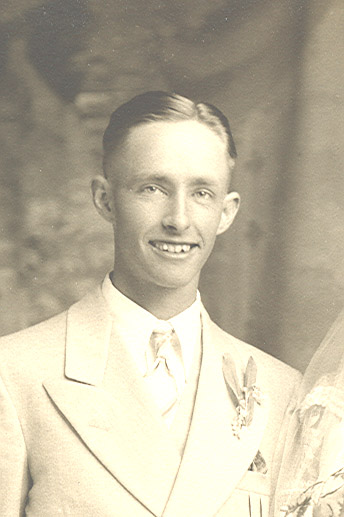
William E. Juhnke in 1937, from his wedding photo
(credit: James C. Juhnke)
 March 2004
vol. 59 no. 1
Back to Table of Contents
March 2004
vol. 59 no. 1
Back to Table of Contents
Jim Juhnke retired in 2002 from teaching history at Bethel College. Since then he has juggled three writing projects that keep bumping into each other--Juhnke family history, Mennonite denominational history, and American peace history.
The late 1930s and early 1940s were years of vigorous activity for the Christian Endeavor of the General Conference Mennonite Church Western District. One expression of that activity was a youth periodical, the Western District Tidings, which began publication in 1939. William E. Juhnke, president of the Western District Christian Endeavor (WDCE), was the founder and editor of the Tidings. His leadership demonstrated the importance of the Mennonite peace witness for youth work in a time of approaching war.

William E. Juhnke in 1937, from his wedding photo
(credit: James C. Juhnke)
The first congregational young people's societies in the Western District emerged in the 1880s. They began gathering for joint annual meetings in1893. (1) Their conventions, held each year in August, were at a separate time and place from the annual Western District Conference. Until 1927 the official minutes were kept in the German language. In the 1930s the WDCE took on more formal organizational shape. It adopted a new constitution in 1935 and, according to the minutes, "For the first time the business of the Conference was transacted by duly elected delegates." (2) Typically only about half of the churches in the district sent official delegates. Dominant on the agenda were issues relating to peace and to international missions.
Church "youth" in the 1930s and 1940s included young people from high school to age thirty and beyond. The Western District of the General Conference Mennonite Church in these years had sixty-one congregations, mostly in Kansas but also some in Oklahoma and one in Nebraska. Most of the congregations had "Christian Endeavor" organizations for the young people, sometimes divided into "Junior," "Intermediate," or "Senior" Christian Endeavor. Young married people in their twenties were in most of the district-wide leadership positions.
William E. "Bill" Juhnke was a member of the Eden Mennonite Church. In 1936, at age twenty-four, he graduated from Bethel College and took a position teaching social studies at Moundridge High School. Bill served as president of Western District Christian Endeavor president from 1938 to 1944. At Moundridge High School (1936-42) and Buhler High School (1942-44), he served as advisor to the Hi-Y clubs, the secondary school version of the Young Men's Christian Association. He was also a member of the executive committee of the Kansas Institute of International Relations, an adult education summer peace program held at Bethel College 1936-40 and then in Wichita.
In 1937 Bill was appointed to his first district WDCE position—Peace Secretary. One of his successful projects was an oratory contest with two divisions—peace orations and missions orations. Seventeen youth entered the contest. The top three winning orators (Paul Goering, Harley Stucky, and Edwin Stucky) were all students at Moundridge High School, where Bill was debate coach. In 1938 Bill took the three winners to Saskatoon, Saskatchewan, to perform at the binational General Conference Mennonite gathering. At that meeting he was elected to a three year term as secretary-treasurer of the General Conference Young People's Union. The YPU executive committee did not have funds for meetings, so that job did not involve much work. In 1941 Bill and his wife, Meta Goering Juhnke, attended the next triennial meeting of the General Conference in Souderton, Pennsylvania-combining that event with a belated honeymoon trip to New York and Niagara Falls.
At the August 1938 WDCE annual meeting Bill was elected president of the organization. He brought a cheerful and enthusiastic style to the task of organizing the executive committee. One of his letters to Florene Krehbiel, the secretary treasurer, began breezily, "'The time has come,' the Walrus said, 'to talk of many things! Of ships, and sails, and sealing wax; of cabbages and kings.' The time has also come for us to talk about C. E. things. So here goes." Then in a long typewritten letter he clarified in order the tasks ahead: organizing the committee, strengthening WDCE publications, planning a peace rally, "stimulating our Christian endeavorers to mission activity," promoting church-wide official papers, instituting a "look-out" system to keep in touch with scattered CE members, planning the annual youth retreat, and fund-raising for a struggling Mennonite school in Saskatchewan. Bill concluded the letter with a vigorous mixed-metaphor call to action: "With all this to discuss it seems necessary for us to put our shoulders to the wheel. . . . So let's shake hands toward achieving a better and more worthwhile Mennonite Christian Endeavor in our district." (3)
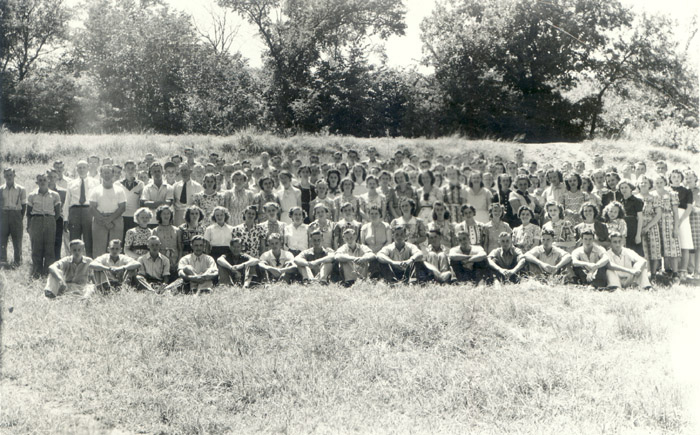
Western District Young People's Retreat at Camp Wood, 1939 (credit: John D. Thiesen)
Bill helped to organize the annual Western District youth retreats, attended by several hundred young people at Camp Wood, a YMCA camp near Elmdale. But his greatest initiative in his first year as WDCE president was to inaugurate a new publication, The Western District Tidings. The first two issues were not very impressive-crudely mimeographed newsletters dated January and May, 1939. The third issue was more sophisticated, with the 1,500 copies printed at the Bethel College printing press. Bill took charge of the subscribers list, the articles published, the relationship with the printer, and the mailing to individual and group subscribers. He paid personally the bill for printing ($19.90) and mailing ($4.80) the third issue. He acknowledged that "our paper has been in its infancy and suffering from experimentitis." But he had plans for improvement and expansion. (4)
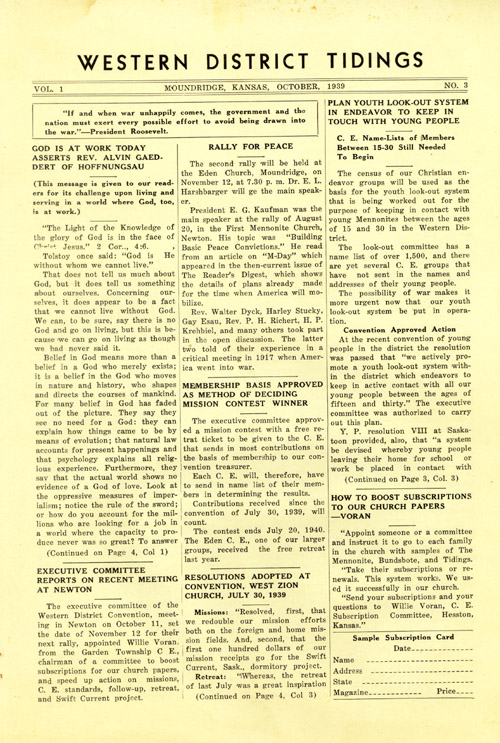
Bill had learned something about publishing a periodical when he was a student at Bethel College. He had been the editor of the Bethel student newspaper, the Collegian. His models for the Tidings were both the Collegian and the official General Conference periodical, The Mennonite. Because the Western District Conference did not have its own periodical (nor did it have a conference headquarters), the Tidings was a notable source of information for the conference in general. During the years of its publication, discussions of the role of the Tidings included an undercurrent of concern that the youth pages of The Mennonite might be an adequate source of information for and about young people. Some people thought the Tidings was too liberal or too aggressive.
The two dominant themes of Tidings articles, apart from news about CE events and people, were international missions and world peace. Bill was enthusiastically committed to both causes. His primary mentor at Bethel College had been president Edmund G. Kaufman, a former missionary in China and a strong advocate of Mennonite pacifism. Kaufman taught that overseas missionary programs were means for promoting higher civilized ideals of justice and peace. Bill put into the first issue of the Tidings a complete list of all home and foreign missionaries of the General Conference Mennonite Church- a total of 128 persons-with the admonition, "Pray for them, and help support them. Is Your society doing its share?" (5) The lead article in that issue was an account of an experience with an International Voluntary Service for Peace work camp in England, written by Bethel College student Robert Kreider. (6)
Germany invaded Poland Sept 1, 1939, the month before the third issue of the Tidings was published. Bill's editorial in that issue, titled "Propaganda," warned against the "war hysteria" fostered by American press and radio. He had two recommendations: Learn about both sides of controversial issues to get all the facts. And remember that "our best guide in our quest for truth is the Bible. . . . The method of the Bible is the method of truth." A boxed insert at the head of the first page of that issue quoted President Franklin Roosevelt, "If and when war unhappily comes, the government and the nation must exert every possible effort to avoid being drawn into the war." Although the Tidings did not provide a running political commentary, its position on national policies such as military conscription and involvement in the war was clear. Bill later wrote that the adoption of military conscription "sort of broke my enthusiasm for democratic government. I am absolutely sure that most people didn't want conscription, and that if we had been given different national leadership that Pearl Harbor could have been avoided and that we would not have been tricked into this war." (7)
Bill's liberal pacifism earned the mistrust of some of the more conservative leaders of the Western District Conference. One of his critics was Rev. Walter Dyck, a pastor and Western District Representative to the General Conference Young People's Union. The two clashed over the Kansas Institute of International Relations (KIIR). Conservatives thought the KIIR was too secular and insufficiently biblical in its peace teaching. At the 1942 WDCE convention, when Bill was nominated for new two-year term as president, Dyck told the gathering that Bill was not eligible for the office, because he was also serving on the executive committee of the General Conference YPU. Bill was elected nevertheless. Dyck sent Bill some letters claiming that people were raising doubts about his religious orthodoxy, and asking that Bill send him a statement of his belief on main doctrines. At one WDCE summer retreat at Camp Wood, Bill was offended by Dyck's response to his personal testimony. As Bill later wrote of it: "We went under the pagoda for a brief meditation and worship period. When my turn came I told, as quite consciously planned to make more or less sure it was my true feeling, about the importance my Church to me, and of the deep meaning in baptism." Dyck's response was to "snort," and to say "That's all right. IF it's the real thing!" Some tension between liberals and conservatives was an ongoing part of Bill's church work, but it was not so divisive or acrimonious to undermine the work of the organization.
Bill had a dream to expand the Tidings into a General Conference-wide publication. He proposed that idea to the General Conference meeting in Souderton, Pennsylvania, but it did not get wide support. None of the other districts had equivalent youth papers. Some leaders feared that a youth paper would compete with The Mennonite, the official publication of the General Conference.
In 1944, as Bill prepared to end his second two-year term as WDCE president, he planned to hand over editorship of the Tidings to others. As in the beginning, he was still keeping track of subscriptions, arranging for the printing, and preparing the printed copies for mailing in his own home. His final issue was March 1944. He turned over the mailing list to Helen Hiebert Mueller, WDCE secretary-treasurer, and gave a detailed explanation of mailing procedures as performed in the Juhnke kitchen-with the help of Meta and their five year old son, Jimmy.
The general procedure was something like this. I would prepare ahead of time for the bundle mailings. Trial and error convinced me that buying ordinary envelopes and slicing them and breaking the edges furnished good material for wrapping. The glue was on the material; one piece could be glued on to the other to make the wrapping longer for the larger bundles. So after the material was in the hands of the printer I would get to work cutting envelopes and writing addresses just opposite to the sticky edge of the envelope strip. I put the no. of copies on with a circle around it; and also put on the amount of postage needed. (8)
Although Bill was undeniably happy to be relieved of his editorial responsibilities with the Tidings, he also had mixed feelings. For more than five years he had published the Tidings as something of a one man show. The June, 1944 issue had his photo on the front page with the announcement of his resignation. It said, "'Bill' has given time, talent, and money to promote the young people's paper of this district. His 'Brain Child' has grown from a small mimeographed sheet to an eight-page paper which is printed by the Bethel College Press and appears quarterly. It has a circulation of 1500." One of his co-workers, Jacob D. Goering, wrote to another member of CE executive committee: "As you undoubtedly know, Bill Juhnke has been the dynamo furnishing the power for this (Tidings) endeavor, and I'm sure you'll agree that he has done wonderfully well. The fact is that he has actually sunk into this work of our paper not only hours and hours of time and work, but he has spent a considerable sum of money of his own putting out each issue." (9)
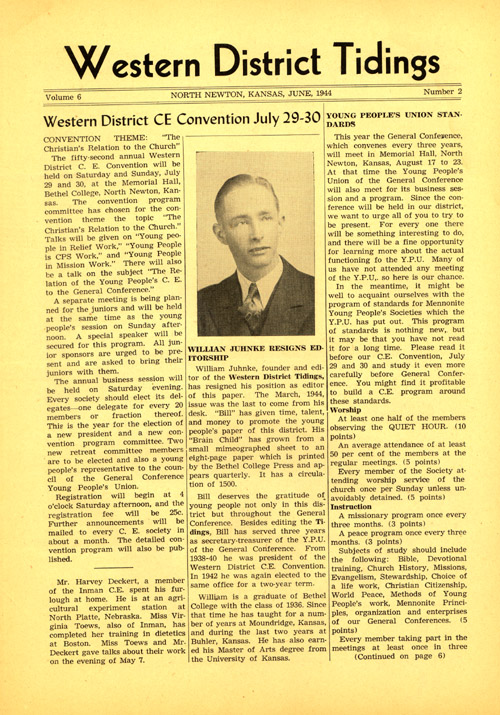
In his final issue as editor of the Tidings, March 1944, Bill restated his strong wartime commitment to Mennonite pacifism. "Mennonite Christians," he wrote, "can hardly agree that any Caesar's voice deserves first obedience. That first loyalty, we humbly submit, is and must forever remain a loyalty to God-to the voice from the hillside of Galilee." The editorial concluded with a statement of five "essentials of the Mennonite belief and practice." These included "(1) belief in God the Creator; (2) belief in the divinity of Jesus; (3) belief in the guidance of the Holy Spirit; (4) belief in the Church's Stewardship of a Saving Gospel, and (5) practice of Christian Brotherhood to all mankind." (10) This formulation, lacking an "essential" about the Bible, would not satisfy the strict conservative evangelical or fundamentalist critics, but they surely represented Bill's own heartfelt convictions.
Bill's front-page article in that final issue of the Tidings was a spirited call for young people to become better informed and more active Christian Endeavor members. He lamented the fact that thirteen of the sixty churches in the Western District had no active CE groups. He took personal responsibility for the apparent lethargy. He had "not written materials interestingly enough, . . . not gotten individual young people in the churches of the district to respond, . . . (and) not inspired the work and officers of the Convention so that information on the projects is more general." Bill's self-criticism was more a measure of his high goals than of his success as WDCE president and Tidings editor. It could be that the war brought on changes among Mennonite youth that Bill interpreted as decline.
The Tidings ceased publication after 1946, and the Western District youth never again sponsored so ambitious and impressive a publication. A new generation emerged into leadership and Mennonite youth work developed along new lines.
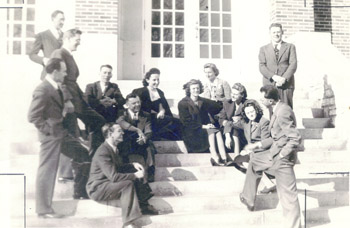
General Conference Young People's Union cabinet, Feb. 19-21, 1946, Bethel College.
Back, left to right, Arnold Nickel; Harold Buller?; Henry W. Friesen, Rosthern; Roland Goering; Ruth Ewert, secretary; Frieda Claassen; Helen Hiebert Mueller; Alice Lehman; Peter Epp, Leamington.
Front, left to right, Esko Loewen, youth editor; Verney Unruh, vice president; Genevieve Buhler?; Elmer Ediger, president. (credit: James C. Juhnke)
1. David A. Haury, Prairie People, A History of the Western District Conference (Newton: Faith and Life Press, 1981), 283-87.
2. Minutes of the Western District Christian Endeavor Convention 1928-1947, Bd. Ms. 105, Mennonite Church USA Archives, Bethel College, North Newton, Kansas.
3. William Juhnke letter to Florene Krehbiel, October 5, 1939, Western District Young People's Union/Christian Endeavor records, folder 1, MCA.II.3.d.3, Mennonite Church USA Archives, Bethel College.
4. William Juhnke letter to Florene Krehbiel, December 28, 1939, folder 1, MCA.II.3.d.3.
5. Western District Tidings 1:1 (January 1939): 3-4.
6. Robert Kreider, "Vagabonding in Europe," Western District Tidings 1:1 (January 1939): 1-2.
7. William Juhnke letter to Helen Hiebert Mueller, February 3, 1943, folder 5, MCA.II.3.d.3.
8. Letter from William Juhnke to Helen Hiebert Mueller, March 25, 1944, folder 6, MCA.II.3.d.3.
9. Jacob D. Goering letter to Helen Hiebert Mueller, n. d., folder 2, MCA.II.3.d.3.
10. William Juhnke, "Do Mennonite Young People Know?" Western District Tidings 6:1 (March 1944): 1, 5.